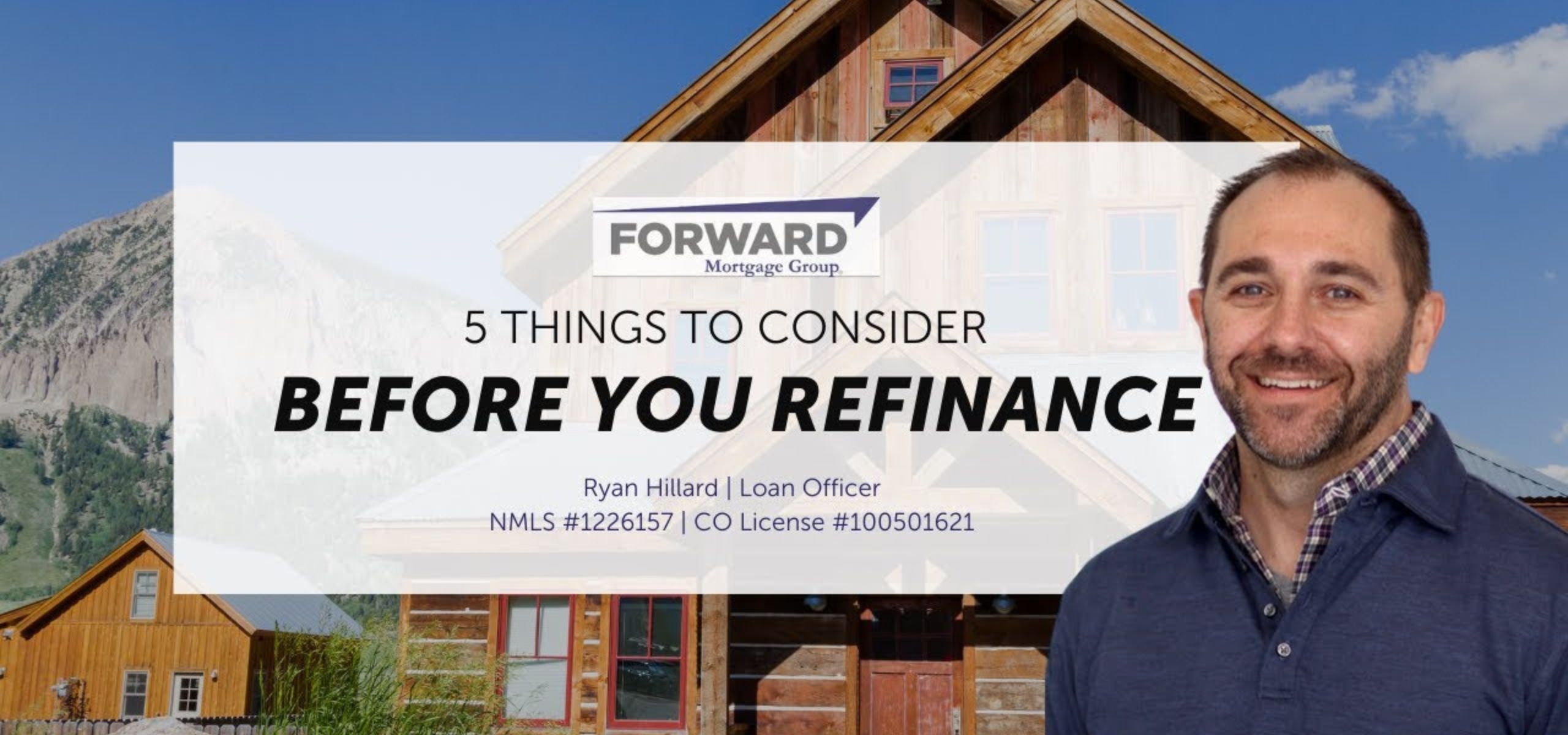5 Things to Consider Before You Refinance
Refinancing Your Mortgage: 5 Essential Considerations for a Smart Decision
Transcript
Ryan Hillard: Hi, this is Ryan Hilliard with Forward Mortgage Group, and I’m here today to talk about knowing if now is a good time for you to refinance your mortgage. Most people think about refinancing to lower their interest rate on their existing loan, and that is always something that’s important to take a look at. Before you jump into refinancing, there are a few other things that I think that you should look at as well. In this video, I’m going to talk about five things that you should consider if you’re thinking about refinancing your home loan.
Can You Lower Your Interest Rate?
Ryan Hillard: With that said, let’s jump into number one, and the number one reason that people think about refinancing is to lower their interest rate and monthly payment. Cutting your interest rate can definitely help you pay less interest over the life of a new loan compared to the remaining term of your original loan. But, even with the lower monthly mortgage payment, You could still be paying more interest by stretching out the new loan term. One of the first things that I’ll do is help you calculate how much interest you would be paying on both loans and then compare the two amounts. If it makes sense for you to refinance, especially if you’re going to be lowering your monthly payment, then it may be a good time for us to move forward. If you don’t know what your current interest rate is, you can find it by looking at your monthly mortgage statement. While this is where most people will stop, I want to help you take this a next step further and see what other options you have with the monthly savings. For example, we can develop strategies to make an additional principal payment to your monthly mortgage. And this would accelerate the total repayment and help you save on interest. You can apply it to other debt that may have a higher interest rate, like credit cards, or we can also work with your financial advisor to discuss investment options like setting up a retirement account. If you don’t already have a financial advisor, that’s not a problem. Just let me know, and I’m happy to make an introduction for you.
How Long Will You Be in Your Current Home?
Ryan Hillard: Let’s move on to number two, which is how long will you be in your current home? Even if you’re able to take advantage of lowering your interest rate and your monthly payment, refinancing still may not make sense if you’re only going to be in your home for the next year or two. It’s going to take a little bit of time to recover the costs associated with refinancing your home, and if you plan on moving soon, then you won’t have the time to recover those costs. Something else to consider is if you have, let’s say, for example, you have 21 years to pay off your existing mortgage, and you get a new 30-year mortgage, you’ve just added nine more years of paying on that before it’s paid off. In this case, you may want to consider a loan for less than 30 years, like a 25, a 20, or even a 15-year mortgage. This may be something to consider, especially if you can lower your monthly payment or even keep the payment the same but still pay off the term faster. This could help you become debt free sooner, maybe get you traveling, retiring, or meet what other financial goals that you have. These are all important things to consider when you’re financing your home and something that I can work with you on to help create a plan.
How Much Home Equity Do You Have?
Ryan Hillard: Next up, number three, which is how much equity do you have here? We’ve been very fortunate over the past few years with home values increasing in many areas, and this is great for you because you may have built up enough equity in your home to take advantage of different refinance options. Your equity is the portion of the home that you own, and it’s calculated by subtracting the mortgage balance, that’s what you owe on your current mortgage, from the home’s market value. If you don’t know the home’s market value, that’s okay. I can help you get an estimate of that by using some of the different tools that I have access to.
What Are Your Closing Costs?
Ryan Hillard: Let’s move on to number four, which is to know how much your closing costs are going to be. Once we’ve had time to sit down and chat about your refinancing goals, I’ll be able to give you an estimate of what your closing costs will be to refinance your home. Your closing costs are going to vary based on things like the interest rate and the loan amount, and then the closing costs will also generally include:
- credit fees
- appraisal fees
- points (which are an optional expense to lower the interest rate)
- insurance
- property taxes
- escrows
- title fees
- lender fees.
If you have enough equity in your home at the time of refinancing, you may choose to finance your closing costs and fees by adding them to the mortgage balance. By the way, don’t be fooled about any of the no-cost mortgage advertisements. There is no such a thing. It does not exist. No-cost mortgage does not mean that it costs nothing. In these cases, the mortgage is basically adding in the fees to the interest rate, so you end up with a higher interest rate than what you otherwise would have.
Can You Pull Out Equity to Consolidate Debt or Make Home Repairs?
Ryan Hillard: The fifth thing to consider when refinancing your home is your equity. Now we just talked about equity a little bit, but what we want to look at here is the possibility of taking out equity to consolidate debt, like credit cards or student loans, maybe buy that boat that you’ve been looking at. You could also think about eliminating mortgage insurance or taking cash out for home improvement projects, or even using it as a down payment on a new home.
Ryan Hillard: Whatever your reason to refinance, the most important thing to do is to work with a licensed mortgage professional like myself. I can help walk you through the steps and look at the options to be sure that the refinance does make sense and fits your goals, and if it doesn’t, I’m not afraid to tell you that. With all of that said, now may be the perfect time to refinance. Be sure to let me know of any questions that you have, anything that we haven’t discussed, and we can come up with a plan just for you.
Ryan Hillard: This is Ryan Hillard with the Forward Mortgage Group, and you can contact me at ryan@fwdmortgagegroup.com 720-201-7261 or my website at www.forwardmortgagegroup.com

